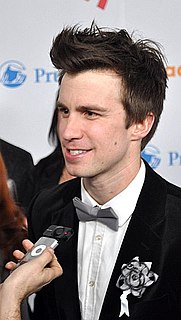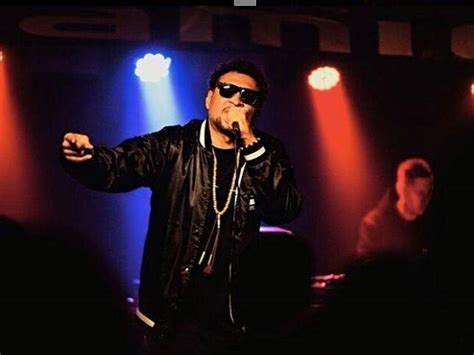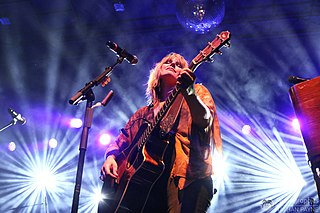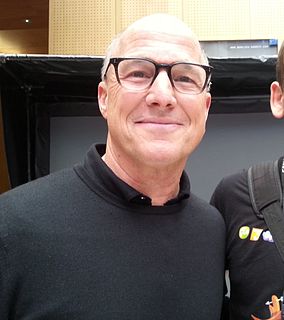A Quote by John Cleese
...when you collaborate with someone else on something creative, you get to places that you would never get to on your own. The way an idea builds as it careens back and forth between good writers is so unpredictable. Sometimes it depends on people misunderstanding each other, and that's why I don't think there's any such thing as a mistake in the creative process. You never know where it might lead.
Quote Topics
Any
Back
Back And Forth
Between
Builds
Collaborate
Creative
Creative Process
Depends
Each
Else
Forth
Get
Good
Good Writer
Good Writers
Idea
Know
Lead
Might
Mistake
Misunderstanding
Never
Other
Own
People
Places
Process
Someone
Something
Sometimes
Thing
Think
Understanding Each Other
Unpredictable
Way
Why
Would
Writers
Your
Related Quotes
When you're working on a creative thing, everyone has an idea, and they're pushing it. The first time you work with anybody, you have to get comfortable with the way another person pushes hard for what they want. Familiarity breeds contempt, people say. But I've found, for creative things, familiarity breeds peace of mind, because you realize you know someone better. You trust each other. You know not to take things a certain way, or a wrong way. You get to where you don't have to waste quite so much time with diplomacy. Things are a little more efficient.
Often when people are claiming that they are not creative, they mean that they are not artists, writers, athletes, or any other media types demonstrating creativity. Or they know someone who always seems to have a lot of ideas and know that they can't match that. We all have a tendency to idolize those who create what we see in the media. I think it's better to use these people as models rather than idols, especially when these people have aspects of their lives that are similar to us. Then we can take their inspiration as we go on to be creative in our own way in our own lives.
We have nearly complete misunderstanding between people of different faiths in Lake Wobegon, and that's probably one reason why we get along so very well. It's when you are trying to convince another person to think the same way that you do that there is friction and trouble between people. But when you feel that the other person is dumber than dirt, too dumb for words - why waste your breath - you get along pretty well. There's no bond between people that's quite so strong as when people each feel slightly superior towards the other one.
To be an actor, it's really tough to find your own voice because you're always tied to other characters and going to auditions and trying to get a job, hoping they'll pick you. And I think it's just so important for an actor to have something else that's creative, something that's creative and you're in charge of.
You shoot this and it always has something of yourself - sometimes it's more and sometimes it's less. I think after the shooting it depends on who your character is. You definitely learn something about yourself, or you get to know sides that you knew you had, but you had never activated or triggered in a way that allowed you to let them out. Bad and good, all of this is in all of us. But you definitely meet another side or a quarter or ten percent of yourself that you had an idea of, but never really knew about.
I like what I do. Some writers have said in print that they hated writing and it was just a chore and a burden. I certainly don't feel that way about it. Sometimes it's difficult. You know, you always have this image of the perfect thing which you can never achieve, but which you never stop trying to achieve. But I think ... that's your signpost and your guide. You'll never get there, but without it you won't get anywhere.
One of my central philosophies is to be creatively driven so I have to be extraordinarily creative in the way I get things done and I have to be really flexible. Striving for the best creativity can be a really moving target if you're trying to budget anything because if you come up with a better idea for something and it's going to make the movie stronger then you have to do it. And that's what I do. The difficulty is that you have to use more judgement as a producer then you might in other places. I have to make unbelievably great creative decisions.
Creativity is not a solitary movement. That is its power. Whatever is touched by it, whoever hears it, sees it, senses it, knows it, it's fed. That is why beholding someone else's creative word, images, idea, fills us up, and inspires us to our own creative work. A single creative act has the potential to feed a continent. One creative act can cause a torrent to break through stone.
That's the one thing I say about the great British shows. You know, I see it on the series on HBO where the season is shortened to like 12 or 6 or whatever it is. You know there's a reason why there's a quality behind that. Because I think the writers as well as the crew and the cast do get burnt out after doing continuous episodes after and over and it feels like a factory rather than something of a creative process. And we get tapped out. That's just my opinion.




































